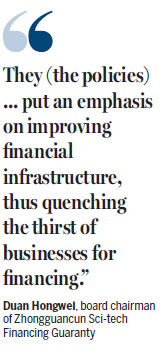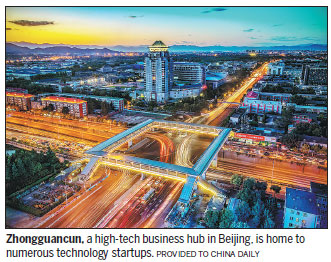Zhongguancun high-tech hub's new policies fuel growth
The administrative committee of Zhongguancun, a hightech business hub in Beijing, announced two new policies in mid-November to support the growth of local private businesses.
One of the policies focuses on addressing the shortage of capital flows in high-tech businesses and the other encourages the creation of "disruptive technologies".
The former is aimed at resolving the urgent financing difficulties facing the companies, while the latter sets its eyes on their growth in the long run, Zhai Lixin, head of the administrative committee, said at a news conference.
"Both are designed to help create a better environment for private businesses," he noted.

The policies called on financial institutions to increase credit to high-tech businesses and support high-tech companies to raise funds, by issuing bonds and commercial instruments and tapping into various capital markets.
Local authorities will also help to improve financing guarantee services for hightech businesses, optimize the credit assessment system for them and advance management innovations in financial institutions, according to the policies.
The administrative committee will earmark over 100 million yuan ($14.38 million) in government financial aid for high-tech businesses next year.
The amount is expected to divert more than 10 billion yuan in nongovernmental investment to the businesses, according to the committee.
Zhongguancun authorities will offer support and services at various stages along the entire process of developing a disruptive technology, ranging from financing and marketing to business matchmaking and media exposure, local officials said.
A project involving a disruptive technology - which has achieved a major breakthrough in implementation or has entered the stage of commercialization or industrialization - will receive up to 30 million yuan in government financial support annually, with a ceiling on the support of 100 billion yuan.
The government will also invite innovation and technological funds or venture capital firms to participate in the investment.
The recruitment of the disruptive technology projects is scheduled to start in early 2019. The notice will be released at the Zhongguancun administrative committee's official website and WeChat account, Chinese media reported.
"The policies came just in time," said Duan Hongwei, board chairman of Zhongguancun Sci-tech Financing Guaranty. "They cover a wide range and put an emphasis on improving financial infrastructure, thus quenching the thirst of businesses for financing."
Xu Zhongxing, president of the Zhongguancun branch of the Bank of Beijing, said that an array of private businesses, ranging from startups and high-growth companies to publicly traded corporations, will benefit from the policies.
A variety of financial businesses, including credit, instruments, bonds, equities and funds, are included in the policies, he added.
Shi Luping, chief scientist at Lynxitech, a Zhongguancun-headquartered company specializing in artificial intelligence technologies, who also serves as director of the Brain-inspired Computing Research Center at Tsinghua University, said: "The policies have created a friendly environment for research. We will make full use of it and concentrate on our research."
Zhai said that in a new round of technological revolution, new technologies are developing so fast that their progress is beyond imagination.
As a national innovation demonstration area, Zhongguancun needs to play a leading role in this regard, he noted.
Wang Xijuan, chairwoman of Beijing Konruns Pharmaceutical, said the government's policies to support the private economy, which include tax reduction, help in financing and creating a fair environment for competition, assure private entrepreneurs and fuel their enthusiasm to make innovations.
"Private companies often have a spirit of persistence and hard work," she said. "I hope more detailed rules and regulations can be released and implemented soon."
Du Yicheng, senior manager of the IP department at BMC Medical, a major respirator maker, said his company has benefited from the tax reduction policy.
Since about 60 percent of BMC's products are sold overseas, he hopes the tax rebate policy could be applied to the cross-border e-commerce sector soon.
"I'm looking forward to more support for small and medium-sized enterprises next year," he said.

